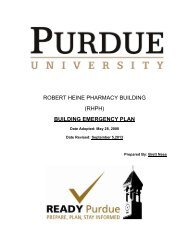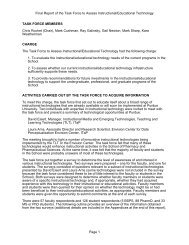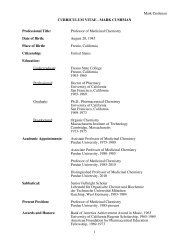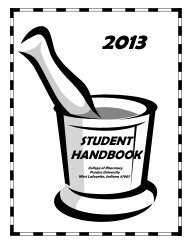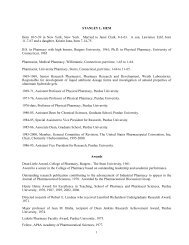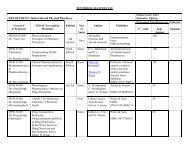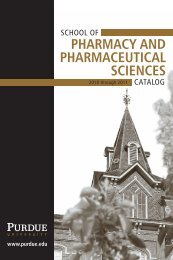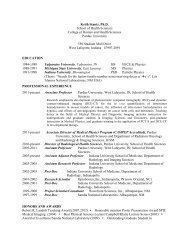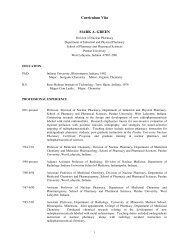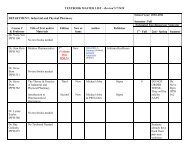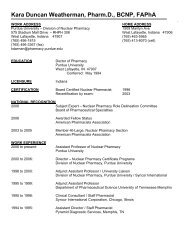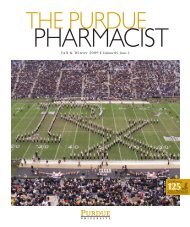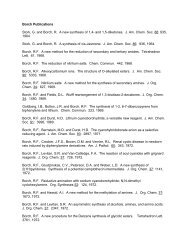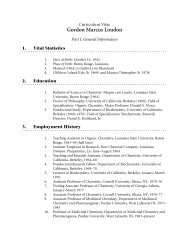Spring/Summer 2011 - Purdue College of Pharmacy - Purdue ...
Spring/Summer 2011 - Purdue College of Pharmacy - Purdue ...
Spring/Summer 2011 - Purdue College of Pharmacy - Purdue ...
Create successful ePaper yourself
Turn your PDF publications into a flip-book with our unique Google optimized e-Paper software.
FACULT Y SPOTLIGHT<br />
Yoon Yeo<br />
Assistant Pr<strong>of</strong>essor,<br />
Industrial and Physical <strong>Pharmacy</strong><br />
Assistant Pr<strong>of</strong>essor (by courtesy),<br />
Weldon School <strong>of</strong> Biomedical Engineering<br />
Dr. Yoon Yeo received her BS<br />
in <strong>Pharmacy</strong> and MS in Microbial<br />
Chemistry from the Seoul National<br />
University in Korea. She worked as<br />
a research scientist at Samyang<br />
Corporation in Korea before beginning<br />
her doctoral studies in 1999 at<br />
<strong>Purdue</strong> University. She earned her<br />
PhD in Pharmaceutics in 2003 and<br />
completed a post-doctoral associate<br />
position in chemical engineering at<br />
the Massachusetts Institute <strong>of</strong><br />
Technology in Cambridge before<br />
returning to <strong>Purdue</strong> in 2007. She is<br />
currently Assistant Pr<strong>of</strong>essor <strong>of</strong><br />
Industrial and Physical <strong>Pharmacy</strong><br />
with a joint appointment as Assistant<br />
Pr<strong>of</strong>essor at the Weldon School <strong>of</strong><br />
Biomedical Engineering.<br />
Dr. Yeo’s research is focused on<br />
developing new drug delivery systems<br />
and biomaterials. Instead <strong>of</strong> creating<br />
new drug entities, she tries to use<br />
biologically inactive (or less active)<br />
ingredients to make drugs behave better<br />
(i.e., go where they are supposed to go<br />
and act in the way they are supposed<br />
to act). Specifically, she is interested in<br />
utilizing particulate dosage forms to<br />
deliver drugs in a target-specific<br />
manner, such as tumors or genetically<br />
defective lung epithelium.<br />
When not in the lab, Dr. Yeo enjoys<br />
watching international movies and<br />
learning about their cultures and<br />
histories. “I had many international<br />
friends when I was in graduate school,<br />
and I used to watch movies with them.<br />
I try the same with my students, who<br />
are from different parts <strong>of</strong> the world<br />
and happen to be great cooks (unlike<br />
me). Last time, we watched an Indian<br />
comedy, 3 idiots. It was a lot <strong>of</strong> fun,<br />
and the food left over fed me the<br />
next three days!”<br />
What first drew you to/interested<br />
you in your research?<br />
My project as a research scientist at<br />
Samyang Co. was to develop microparticles<br />
releasing a protein drug for an<br />
extended period. It was my first practical<br />
exposure to the field <strong>of</strong> controlled drug<br />
delivery. I was excited to learn how new<br />
drug delivery systems could change the<br />
fates <strong>of</strong> drug molecules, which would<br />
otherwise be inconvenient to administer<br />
and/or much less effective.<br />
What is it that interests you<br />
most about your research?<br />
Drug delivery research <strong>of</strong>ten means a<br />
battle with biological environment that<br />
interferes with the intended functions<br />
<strong>of</strong> drug carriers. A number <strong>of</strong> new drug<br />
delivery systems, which are designed<br />
with brilliant features, fail when they do<br />
not adequately address the biological<br />
obstacles. I am excited about discovering<br />
a new challenge, coming up with a new<br />
way to overcome such a challenge, and<br />
observing the difference our approach<br />
can make.<br />
What do you hope to discover<br />
through your research?<br />
I want to find a way to help patients in<br />
a way that has not been possible due<br />
to the lack <strong>of</strong> proper delivery systems.<br />
For example, we work on developing<br />
new inhalable medicine for cystic fibrosis<br />
patients who suffer critically from<br />
obstructive lung diseases. There is no<br />
easy way to overcome the tenacious<br />
phlegm layer accumulating in the<br />
airways and deliver medicines to the<br />
underlying tissues, so we look for<br />
various ways to combat this phlegm<br />
barrier. Another research goal is to<br />
find a new way <strong>of</strong> treating tumors with<br />
metastatic potential—a true killer <strong>of</strong><br />
cancer patients. The success <strong>of</strong> this<br />
research depends on how we make<br />
use <strong>of</strong> specific biological and chemical<br />
markers that distinguish the tumor<br />
cells from the innocent bystanders.<br />
What are you currently<br />
working on in your lab?<br />
We are developing inhalable gene<br />
carriers for cystic fibrosis patients<br />
and polymeric nanoparticles for<br />
target-specific chemotherapy. For the<br />
former, we utilize an osmotic agent as<br />
a carrier in anticipation that mobilizing<br />
water in the phlegm with the osmotic<br />
32 The <strong>Purdue</strong> Pharmacist



